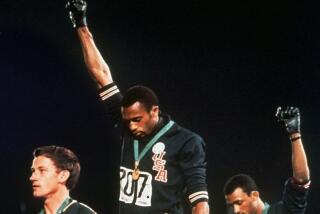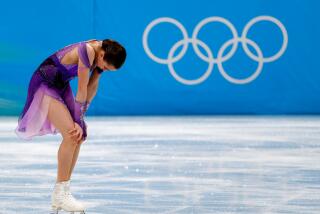Greeks Hit Hard by Their Heroes’ Fall From Grace
- Share via
ATHENS — It was nothing short of a Greek tragedy: The host nation of the 2004 Summer Olympics appeared doomed Friday to lose its two top athletes to a drug scandal and, with that, its best chance to win a gold medal and regain much of its self-esteem.
In a major blow to the national psyche just as Greeks were beginning to savor the hard-fought opening of the Olympics, the fates of sprinters Costas Kenteris and Katerina Thanou hung in doubt pending a disciplinary hearing on their failure to report for a drug test.
The two athletes are national heroes in Greece -- suddenly suspected of bringing shame to their nation. Kenteris, especially, is a Greek-god version of Michael Jordan, his photo everywhere and quickly recognizable. Greeks were angry, shocked and bitter, speaking universally of feeling betrayed by beloved athletic stars and deflated after their successful struggle to bring the Olympics to its ancient birthplace.
“Tell us the truth -- prove you are clean!” demanded the headlines of one Athens newspaper.
“So many people worked so hard for the Olympics,” said a government official. “This was supposed to be a day of celebration, and they messed it up.”Kenteris and Thanou failed to report for a drug test on Thursday evening, and then were involved in what they said was a middle-of-the-night motorcycle accident. The sprinters were confined to a hospital for the next 48 hours, making them unavailable for a disciplinary hearing Friday. Greece is expected to withdraw the pair from the Games to spare the nation further embarrassment, a government source told The Times.
The International Olympic Committee, upon receiving notification of the pair’s purported medical condition, agreed to postpone the hearing until Monday “to ensure a fair process and give due consideration to the athletes.” A single missed drug test carries a warning; two are equal to a failed drug test and can lead to a two-year ban. There were conflicting reports Friday about whether Kenteris and Thanou also had skipped a screening in Chicago earlier this week.
The scandal could not have erupted at a worse time. Greece’s preparation for the Olympics, maligned here and abroad for its delays and cost overruns, had finally begun to pay off; much of the world had come to praise the country’s efforts, and Greeks were beginning to feel validated at their ability to stage such a colossal event.
Now, for many of them, the scandal has overshadowed the Games themselves, which opened Friday night in spectacular fashion. Kenteris was considered the likely choice to have occupied that vaunted position of final torchbearer who lights the Olympic caldron before a global audience at the opening ceremony. Instead, Nikolaos Kaklamanakis, a windsurfing gold medalist from the 1996 Games at Atlanta, drew the honor.
Speculation over the sprinters’ fate consumed the nation Friday; it was the buzz at Athens’ shaded sidewalk cafes and sunny plazas. Some Greeks suspected the motorcycle accident was staged to give the pair an excuse to stay away from drug testing. Others suggested the athletes were the real victims, and that their misfortune was part of a conspiracy to eliminate Kenteris from competition and detract from the larger scandal of U.S. athletes’ drug-test failures.
“This is really terrible,” Constantine Vergopoulos, an economist, said at a cafe in Athens’ upscale Kolonaki neighborhood. “All Greeks are very proud of him. He was the symbol of Greek participation in the Olympics and we wanted to see him distinguish himself, and us. It’s a terrible shock.”
Greek television, which had been broadcasting pro-forma and relatively tame coverage of the run-up to the Olympics, dedicated virtually nonstop reports to Kenteris and Thanou. Reporters staked out the suburban hospital where the two had been taken; one television station smuggled a camera into the building and captured what it said was a picture of Kenteris on a gurney in a neck brace.
Kenteris, 31, and Thanou, 29, were Greece’s best hopes for medals in these Olympics; he won gold in the 200 meters in the 2000 Sydney Games -- the first Greek male to win a medal in a running event since 1896 -- and Thanou took silver in the 100 meters.
According to Greece’s Hellenic Olympic Committee, Kenteris and Thanou, who routinely train together, were called by the IOC to submit to drug tests Thursday evening around 6:15 but could not be found in their Olympic village rooms. They had left to pick up personal items from their respective homes, the committee said. A Greek track official told authorities he notified the athletes of the test and they were intending to return to Olympic village to comply.
Several hours later, however, they were at the home of their coach, Christos Tzekos, in the town of Glyfada, according to sources familiar with the sequence of events. Around midnight, according to this account, they boarded a motorcycle and were headed back to the Olympic village when they crashed and were taken to the hospital.
Police and hospital officials said their injuries were not serious. “They’re a little shaken up by what has happened to them,” Greek track official Manolis Kolimbadis told reporters outside the hospital.
IOC President Jacques Rogge, who was bombarded with questions about the case at a news conference Friday, said the runners’ hero status would not influence the inquiry. In theory, they could be back at the Olympic village in time to compete in their events late next week. But several Greek observers and experts said they thought that was unlikely.
Government spokesman Theodoros Roussopoulos said Prime Minister Costas Karamanlis was immediately briefed Thursday evening about the trouble, which other sources said kept many government officials up all night. Roussopoulos said, however, that he would not assume the role of Cassandra.
“There are over 400 Greek athletes [in competition]; let’s honor them and let them show they are faithful to the Greek ideals,” he said. “By no means are the Games over for Greece.”
Several Greek newspapers reported that Kenteris and Thanou were tested under pressure from U.S. Olympic officials in response to the heightened scrutiny of their own athletes. That fed into some of the conspiracy theories circulating around the affair.
But the two Greeks had been at the center of whispered suspicions for some time. Neither has tested positive for the use of banned performance-enhancing drugs or chemicals. But both, especially Kenteris, have been a focus of authorities in anti-doping and track and field organizations for years.
Kenteris won the 200 at the world championships in Edmonton, Canada, in 2001 but has been seen infrequently since. He dropped out of the 2003 world championships in Paris, citing a leg injury. Later that year, he and Thanou were training in Qatar when they were supposed to be in Crete. Athletes are required to make anti-doping officials aware of their whereabouts at all times to make spot out-of-competition tests possible.
Anti-doping officials have long been suspicious of Tzekos because his runners have appeared only at major championships and have largely ignored the lucrative European track and field circuit.
Times staff writer Alan Abrahamson contributed to this report.
More to Read
Go beyond the scoreboard
Get the latest on L.A.'s teams in the daily Sports Report newsletter.
You may occasionally receive promotional content from the Los Angeles Times.







